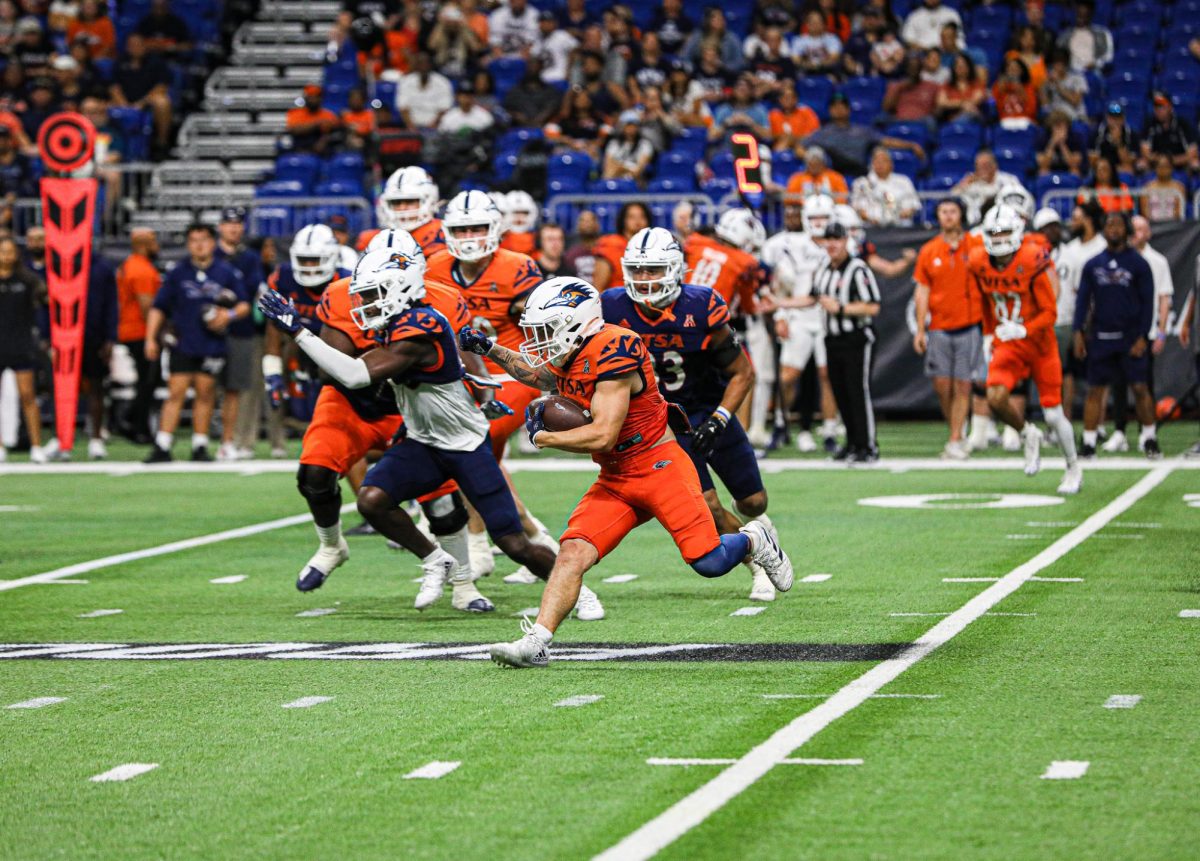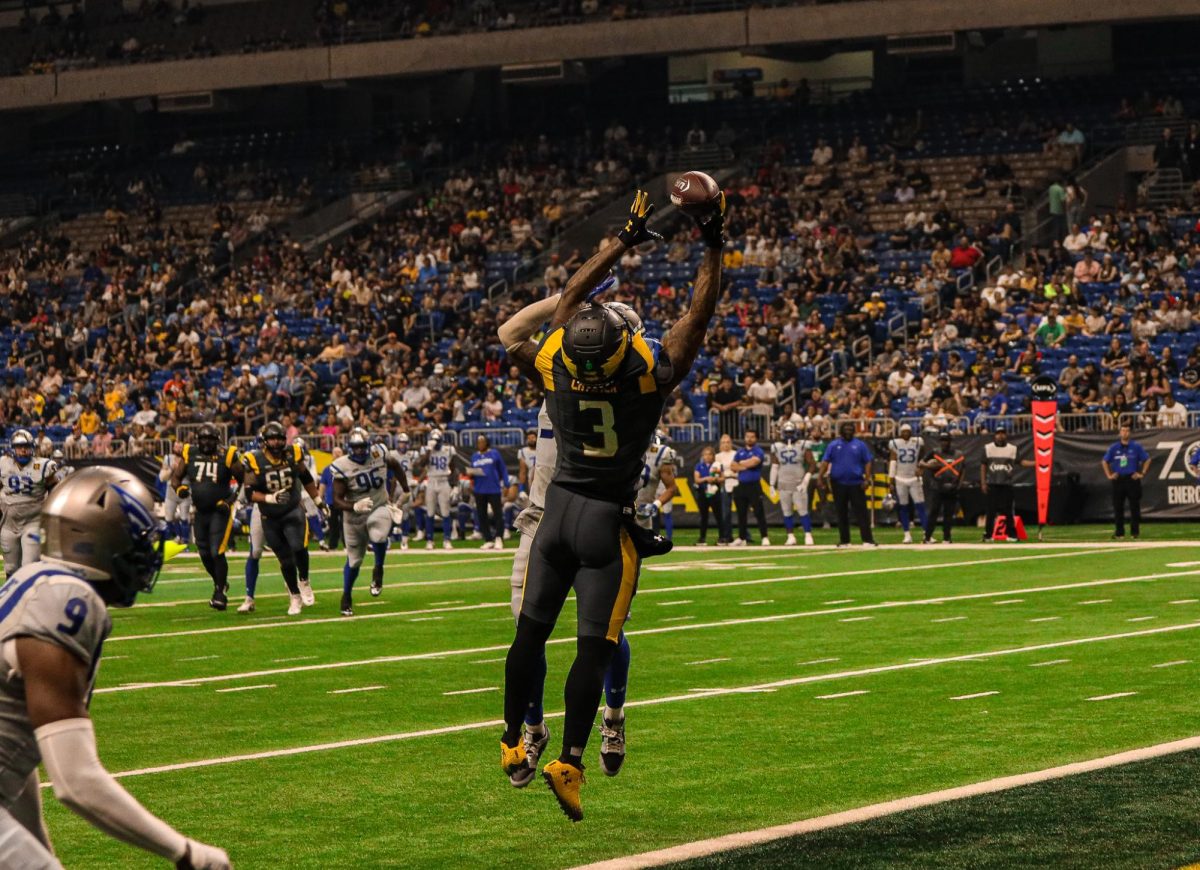
Pedro Zanotelli is proof that being an athlete and a university student is a rarity in most countries.
“If I was in Brazil, I would be either studying or playing tennis. I would never be able to do both,” Zanotelli explains. In fall 2008, Zanotelli came to UTSA from Fortaleza, Brazil in pursuit of a college degree and a chance to do what he loves—play tennis.
From the beginning, Zanotelli knew that he wanted to live in a place where he would have the same comforts of home; like Brazil, he wanted to attend school in a city where the weather was mostly hot and rarely cold. Having two friends from Brazil who were already enrolled at UTSA helped him make his decision.
When Zanotelli first came to UTSA, he admits that he was only interested in receiving his degree, but eventually became more focused on tennis.
“Here, you play for a team. You’re representing the school,” Zanotelli said. “The team depends on you. The result of the team depends on how you do in a match. You have to be much more focused; you have to show your teammates that you care and be 100 percent in everything.”
Fellow tennis player Yannick Junger says that he spends most of his time surrounded by his teammates. Similar to Zanotelli, Junger left his home of Stuttgart, Germany to come to UTSA so that he could also continue to play tennis while completing a business degree, a task he deems “almost impossible” and “too time consuming” in Europe.
Since coming to America, Junger has found it difficult to be away from his family and friends. “You can make on-the-surface friends with everybody. You go to a party and you meet 60 people you consider friends—I don’t do that—but to make good friends is always difficult. It doesn’t matter where you are,” Junger reflects.
Junger spent the majority of his first semester trying to adapt to his new home, especially the fact that a vehicle is needed to accomplish most tasks. However, Junger has embraced some of the challenges that he has confronted. “Being in a foreign environment and adapting to it and getting along with different beliefs with a multicultural background is pretty good to be able to perform in that situation.”
During his time at UTSA, Junger has strived to immerse himself in his education and is proud of his 3.44 GPA. Junger attributes his success to UTSA’s learning resources such as private tutoring for athletes, study hall and The Writing Center. Being able to establish and maintain communication with his professors has also been helpful to Junger.
“My best friend studies in Switzerland and he said that he has no contact with his professor; he can’t e-mail him, he can’t talk to him after class. They don’t have office hours. He was pretty impressed that it’s common here. It’s one big thing that I really appreciate,” Junger said.
Jeromie Hill, sophomore forward for UTSA’s men’s basketball team, experienced his share of struggles with the SAT when he was initially trying to become a UTSA student from his home in Cairns, Australia.
“I had a 2.0 GPA, so I needed a very high SAT score and all the stuff on the SAT was American math and the English was written a little bit different. For me, it was really hard to grasp,” Hill admits. “I had tutoring to try and get it and a month before I was due to come here I got the score I needed, so that was a relief. Since being here, school has been the most difficult part of it, but my GPA at the moment is about a 3.4, so I’m doing just fine.”
Aside from improving himself academically, Hill has also seen improvement athletically because of the difference in athleticism between Australians and Americans. Hill took note of the quickness and strength that American athletes show in their upper body.
“In Australia, basketball is all involved with your feet. So I’ve had to get my upper body stronger to compete,” Hill says. “I already have the legs, so just being able to jump up and down quicker and be more explosive is probably one thing that I’ve definitely increased since I’ve been here.”
Hill’s athletic performance paid off when he was named Southland Conference Freshman of the Year in March 2011. “Being a freshman, doing what I did in that game,” Hill pauses, “I felt like I really deserved that win and earned that. That was a big thing.” Hill looks back fondly on his first year at UTSA calling it a nearly perfect freshman year, which is almost ironic as Hill didn’t intend on attending college because it isn’t common in his family or among Australians.
For Hill’s teammate Alex Vouyoukas, forward and center for the UTSA men’s basketball team, being a part of the team that won the first NCAA game in all of UTSA’s sport history, is the achievement he is most proud of. Vouyoukas is a senior and will soon graduate from UTSA with a degree in Economics.
Vouyoukas sees himself going into the banking industry and becoming a manager or a consultant—that is if he doesn’t make it as a professional basketball player. Vouyoukas has deemed his life as a college athlete in America as an absolute positive experience. In his native home of Athens, Greece, college sponsored sports don’t exist.
“First of all, there’s no such thing,” Vouyoukas states matter-of-factly. “It’s either you’re professional or you’re not and you don’t play at all.”
If Vouyoukas were to have become a
professional athlete in Greece, it would be difficult for him to purse a college degree at the same time.
“As a professional athlete you usually practice twice a day, so you’ll have to squeeze in classes, and then you have to drive from one side of Athens—where I’m from—to the other and then drive back to your house. It’s not like here where it’s all together,” Vouyoukas explains.
Getting to UTSA to study and play basketball has been an experience that Vouyoukas would never trade, because the obstacle of even being considered and recruited is difficult. “High school coaches here, they recruit guys from when they’re 13, 14 years old. Where as in Greece, you’re 17, 18 and you have to send tapes and hopefully someone will like you, and it’s a lot more difficult,” Vouyoukas reveals. “You may be a really good player, but they won’t know you because they can’t actually see you. They can’t drive down the street and watch a high school game, for example.”
The notion that an American college degree is held to a higher standard than a college degree from Greece is appealing to Vouyoukas; however, he realizes that it’s not something that will simply be given to him without effort. Being a student at UTSA has encouraged Vouyoukas to put more time and effort into his studies. “It’s not only basketball, it’s an education too. Your freshman and sophomore years you can get away with opening up a book every now and then, but as you get older, the upper level classes get pretty hard. It’s really put in perspective that I need to work hard in academics,” Vouyoukas reasons.
But for the student athlete who is thinking about leaving his or her country to play sports, Vouyoukas thinks that “as long as you love the sport, because you have to love it, it can take you anywhere.”











